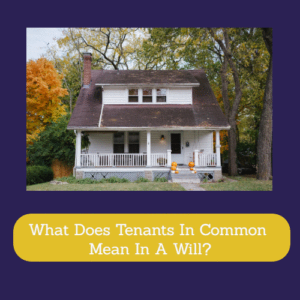There are two ways you can jointly own property in the UK. As joint tenants and as tenants in common. But what does tenants in common mean in a will?
jointly own property in the UK. As joint tenants and as tenants in common. But what does tenants in common mean in a will?
Are there disadvantages or advantages of being tenants in common as opposed to joint tenants? What are the problems for the person inheriting the other person’s share of the will if they want to sell?
To be connected to a specialist solicitor near to where you live or work, please either call us now on 0845 1391399 or complete a Free Online Enquiry.
Let’s take a look:
What Are The Differences Netween Joint Tenants And Tenants In Common?
Joint tenants and tenants in common sound very similar, but they mean very different things for how property is jointly owned and what it means in a will.
The key differences between joint tenants and tenants in common are:
Joint Tenants
Joint tenants own the whole property together equally. It can be thought of as a 50-50 split.
This has some advantages. For one, it’s simple. There’s no need to decide who owns how much of what, as there can be when owning property as tenants in common.
For these reasons, choosing to own property as joint tenants is something that’s often done by couples just starting out on their life together. The thought that something might go wrong in the future seems very far away.
When a joint tenant dies, the situation is simpler too. However, it’s also more limited in terms of choice. The surviving tenant will automatically inherit the entire property that they once shared ownership of.
What’s known as the “Right of Survivorship” means that usually not even a joint tenant’s wishes expressed in their will can overwrite the automatic inheriting of full ownership by the surviving joint tenant.
Tenants In Common
Tenants in common can specify how much of a property they each own. They own only those specific shares. This might also be a 50-50 split. Or it can be different so that it reflects divergent levels of income or deposit contributed by the individual tenants.
There are many advantages to this. Flexibility and the sense of fairness that it can create between tenants are high among them.
That said, it’s also a more complex arrangement to set up than joint tenants. Of course, any property ownership agreement should be drawn up with expert legal advice on hand. Yet becoming tenants in common will require this expertise even more than other arrangements because of the potential complexity.
The other difference between being tenants in common and being joint tenants is what it means in a will. Because the shares of a property owned by a tenant in common can be distributed as part of their will.
In a way, this can be seen as more beneficial flexibility. Yet it also has the potential to create disputes.
The Potential For Will Disputes Created By Tenants In Common
Being tenants in common can cause problems for the person inheriting the other person’s share of the will. Especially when they want to sell.
For example, you can easily picture a scenario where a married couple buy a property as tenants in common. When one sadly passes away, their will stipulates that a child from a previous marriage should inherit their share.
This child has inherited a share of a property, which can be good for them. Yet they are unlikely to want to live in the property with their parent’s former partner. When this happens, there are usually three options. These are:
- They buy you out
- You buy them out
- You both agree to sell the property
These sound like they should be clear and obvious solutions. Yet there is a large potential for disagreement as to the favoured course of action.
You might want to sell the property. They might want to keep it, but not be able to afford to buy you out. In these circumstances, it’s wise to seek professional legal advice from a solicitor as to how to proceed.
What Does Tenants In Common Mean In A Will?
For a will, tenants in common means that the owners of the property in question can choose what happens to their share after they die.
If they choose the other tenant as their beneficiary, there isn’t a problem. However, if someone little known or of differing mind on the favoured solution as to what to do with the property inherits their share, there is potential for disagreement.
This makes it important to be open and honest about the arrangements made in the wills of any tenants in common if at all possible. Because what it means for the surviving tenant and the beneficiaries can be the difference between a happy and an argumentative future.
Need Specialist Advice On What Tenants In Common Means In A Will?
Solicitors Near Me can put you in touch with just the right friendly and approachable will solicitor – for free and with no obligation.
Get in touch today for a chat about your specific situation.
Solicitors Near Me
To be connected to a specialist solicitor near to where you live or work, please either call us now on 0845 1391399 or complete a Free Online Enquiry.
